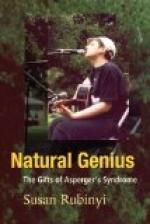Music’s best seed-plot; when in ripen’d airs
A golden-headed harvest fairly rears
His honey-dropping tops, ploughed by her breath,
Which there reciprocally laboreth.
In that sweet soil it seems a holy quire,
Founded to th’ name of great Apollo’s lyre;
Whose silver roof rings with the sprightly notes
Of sweet-lipp’d angel imps, that swill their throats
In cream of morning Helicon; and then
Prefer soft anthems to the ears of men,
To woo them from their beds, still murmuring
That men can sleep while they their matins sing.”
What wealth of imagery and proud association of ideas—the bubbling spring, the golden, waving harvest, “ploughed by her breath”—the fane of Apollo suggesting in a word images of Greek maidens in chorus by the white temple of the God, the dew of Helicon, the soft waking of men from beneficent repose. It is all very well to talk of a bird doing all this: we admire nightingales, but Philomela never enchanted us in this way; it is the sex with which we are charmed. The poet’s “light-foot lady” tells us the secret. We are subdued by the loveliest of prima-donnas.
There is more of this, and as good. The little poem is a poet’s dictionary of musical expression. Its lines, less than two hundred, deserve to be committed to memory, to rise at times in the mind—the soft assuagement of cares and sorrows.
A famous poem of Crashaw is “On a Prayer-Book sent to Mrs. M.R.” It breathes a divine ecstasy of the sacred ode:
“Delicious deaths, soft
exhalations
Of soul; dear and divine annihilations;
A
thousand unknown rites
Of
joys, and rarefied delights.”
It is human passion sublimated and refined to the uses of heaven, but human passion still—the very luxury of religion—the rapture of earth-born seraphs, as he sings with venturous exultation:
“The rich and roseal spring
of those rare sweets,
Which with a swelling bosom there she meets,
Boundless and infinite, bottomless treasures
Of pure inebriating pleasures:
Happy proof she shall discover,
What joy, what bliss,
How many heavens at once it is,
To have a God become her lover!”
Mrs. M.R., whether maid or widow we know not—in Crashaw’s day virgins were called Mistress—has another poem addressed to her—“Counsel concerning her choice.” It alludes to some check or hindrance in love, and asks:
“Dear, heav’n-designed
soul!
Amongst
the rest
Of
suitors that besiege your maiden breast,
Why
may not I
My
fortune try,
And venture to speak one good
word,
Not for myself, alas! but
for my dearer Lord?
* * * * *
Your first choice fails; oh,
when you choose again,
May it not be among the sons
of men!”




